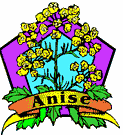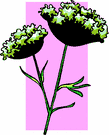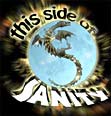An updated version of this web page is now available at the new Teen Witch website anise.

Anise is a plant and an herb.
- botanical information
- history
- part used
- astrological correspondences
- magick correspondences and uses
- ritual uses
- Goddesses and deities
- essential oil
- health care
botanical information:
Botanical name: Pimpinella anisum
Common name: anise, anise seeds
Use the botanical name when ordering seeds (bulbs, etc.) or when looking up information in the library. Common names vary by nation, culture, and region, and sometimes the same common name is applied to different plants.
Threatened species: Anise scented myrtle oil is from the Backhousia anisata, a rare tree from the Bellinger and Nambucca valleys in the north east of New South Wales, Australia.
history:
History: Anise was one of the ingredients mentioned in the Eber’s Papyrus. The Eber’s Papyrus (from between 1600 B.C.E. and 1550 B.C.E.), was discovered by German Egyptologist Georg Ebers in 1874 C.E. The Eber’s Papyrus is the oldest known complete medical textbook in existence. Most scholars believe that it is copy of a much earlier text, probably from around 3100 B.C.E. The Eber’s Papyrus includes information on surgery and internal medicine, including a list of more than 800 drugs.
Anise was listed among many aromatic plants in a scroll of cuneiform from the great library at Nineveh. The library at Nineveh was established by King Ashurbanipal of Assyria (668-633 B.C.E.).
Pythagoras prescribed anise to treat epilepsy in the sixth century B.C.E.
Hippocrates recommended anise for coughs in the fifth century B.C.E.
Pliney recommended anise as a breath freshener in the morning (a purpose that anise does work for). Pliney also recommended keeping anise near the bed to prevent bad dreams.
part used:
|
Part Used: Fruits, frequently called “seeds”. Information courtesy of Mountain Rose Herbs |
astrological correspondences:
Astrological planet: Moon and Jupiter ![]()
![]()

magickal correspondences and uses:
Gender: masculine (traditional western European magickal gender)
Western element: air
Magickal uses: awareness, blessing, energy, joy, protection, and purification
Magickal uses: Used to entice the spirits to aid your spells.
Magickal uses: Romans kept anise near or in their pillows to prevent bad dreams.
Amulet: Use anise in an amulet for a child’s room to prevent bad dreams.
Lunar spells: See the article on the Moon for a list of herbal substitutes for anise (as an herb) in lunar spells.
Jupiter spells: Anise (as an herb) may be used in as an ingredient or substitute for magick spells and formulas related to Jupiter matters (growth, legal matters, luck, meditation, money, prosperity, settling legal matters, and spirituality). Be careful about substitutions for preparations that will be ingested or come in contact with the skin. These substitutions do not apply to medical uses. See the article on Jupiter for a list of herbal substitutes for anise.
Magickal substitutions: Rosemary usually may be safely substituted for any herb in magick spells and rituals. Roses may safely be substituted for any flower.

Magical Uses information courtesy of 
|
ritual uses:
Ritual uses: Used in wedding cakes (anise helps digestion).
deities associated with anise:
essential oil:
Essential Oil: Anise essential oil can be used for both aromatherapy and magick.
Method of Extraction: steam distilled (true essential oil)
Color: clear
Consistency: thin
Perfumery Note: top
Strength of Initial Aroma: medium
Aromatic Description: rich and sweet with distinctive scent of licorice
Constituents: a-pinene, camphene, B-pinene, linalool, cis-anethole, trans-anethole, safrole, anisaldehyde, acetoanisole
Aromatherapy Uses: bronchitis, colds, coughs, flatulence, flu, muscle aches, rheumatism
Safety Information: Caution with sensitive skin or skin problems; avoid if have endometriosis or oestrogen-dependent cancers. Anise essential oil is narcotic and can slow circulation in large doses. See also health notes below.
Using essential oils: Essential oils are just too concentrated and too expensve to use without dilution. If you purchase pure essential oil from a source such as Mountain Rose, you will want to place just a drop or two into a neutral carrier vegetable oil or jojoba. This conservation is typical of the use of essential oils in spells and other magick. It is wise to test a bit of any essential oil on your inner wrist before use. If any irritation occurs, do not use the essential oil. Keep essential oils out of reach of children and pets and away from heat and light. See the article on essential oils for detailed information on how to mix and use essential oils.

health care uses:
Health Notice: Attempting to be an amateur doctor is potentially dangerous to your health. This web page is not professional medical advice. Nothing on this website should be considered as a substitute or replacement for professional medical advice. Persons should seek the advice of qualified health providers. Self-medication should not be used as a substitute for professional medical care. Please confirm all self-medication with your doctor or health care professional. See the article on healing for recommended healers.
traditional medicine:
Traditional Medicine: While many traditional practices have been scientifically verified, some are now known to be dangerous. Seek the advice of qualified health care providers.
Traditional medicinal uses: Anise was one of the ingredients mentioned in the Eber’s Papyrus, the oldest known complete medical textbook in existence. Most scholars believe that it is copy of a much earlier text, probably from around 3100 B.C.E. Anise was listed among many aromatic plants in a scroll of cuneiform from the great library at Nineveh. The library at Nineveh was established by King Ashurbanipal of Assyria (668-633 B.C.E.). Pythagoras prescribed anise to treat epilepsy in the sixth century B.C.E. Hippocrates recommended anise for coughs in the fifth century B.C.E. Note that not all traditional medications are effective or even safe.
Some herbs may be poisonious under some conditions. Exercise appropriate care.
Wild gathering: Avoid wild gathering. Some plants are endangered species. Some plants can be toxic just by touch. Even experts can make deadly misidentifications of wild plants. Please grow your own herbs in your own goddess garden (or window boxes).
An updated version of this web page is now available at the new Teen Witch website anise.
See also: star anise and herbs














